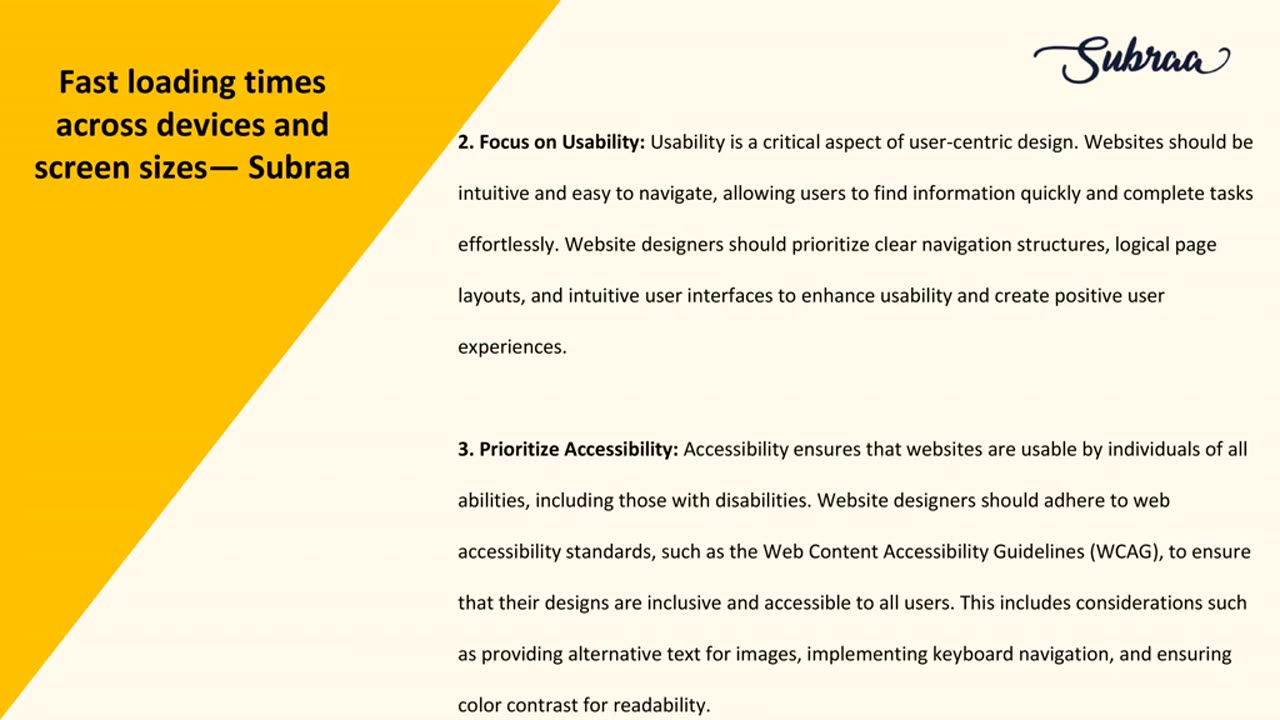Premium Only Content

Fast loading times across devices and screen sizes — Subraa
Creating user-centric websites is paramount to success. A user-centric approach prioritizes the needs, preferences, and behaviors of website visitors, ensuring that their experiences are intuitive, engaging, and ultimately satisfying. To achieve this, Web Designer Singapore must adhere to key principles that guide the development of user-centric designs.
1. Understand Your Audience: The foundation of user-centric design lies in understanding the target audience. Website designers must conduct thorough research to gain insights into the demographics, preferences, and behaviors of their intended users. By understanding who they are designing for, designers can tailor the website’s content, functionality, and aesthetics to meet their needs effectively.
2. Focus on Usability: Usability is a critical aspect of user-centric design. Websites should be intuitive and easy to navigate, allowing users to find information quickly and complete tasks effortlessly. Website designers should prioritize clear navigation structures, logical page layouts, and intuitive user interfaces to enhance usability and create positive user experiences.
3. Prioritize Accessibility: Accessibility ensures that websites are usable by individuals of all abilities, including those with disabilities. Website designers should adhere to web accessibility standards, such as the Web Content Accessibility Guidelines (WCAG), to ensure that their designs are inclusive and accessible to all users. This includes considerations such as providing alternative text for images, implementing keyboard navigation, and ensuring color contrast for readability.
4. Optimize for Performance: Website optimisation and performance plays a crucial role in user experience. Slow-loading pages and laggy interactions can frustrate users and lead to high bounce rates. Website designers should optimize website performance by minimizing file sizes, leveraging browser caching, and implementing responsive design techniques to ensure fast loading times across devices and screen sizes.
5. Solicit User Feedback: User feedback is invaluable in improving website design and enhancing user experience. Website designers should actively solicit feedback from users through surveys, user testing sessions, and analytics data analysis. By listening to user feedback and incorporating their insights into design iterations, designers can continuously refine and improve the user experience.
By adhering to these key principles, Web designer Singapore can create user-centric designs that resonate with their audience, foster positive user experiences, and ultimately drive success for businesses online. In today’s competitive digital landscape, prioritizing user-centric design is essential for staying ahead of the curve and delivering websites that truly meet the needs of their users.
Pop over : https://www.subraa.com/
-
 14:05
14:05
Sideserf Cake Studio
1 day ago $20.34 earnedHYPERREALISTIC HAND CAKE GLOW-UP (Old vs. New) 💅
78.4K15 -
 28:37
28:37
marcushouse
1 day ago $15.22 earnedSpaceX Just Dropped the Biggest Starship Lander Update in Years! 🤯
49.5K20 -
 14:54
14:54
The Kevin Trudeau Show Limitless
4 days agoThe Hidden Force Running Your Life
133K28 -
 2:16:35
2:16:35
DLDAfterDark
15 hours ago $17.88 earnedIs The "SnapPocalypse" A Real Concern? Are You Prepared For SHTF? What Are Some Considerations?
43.7K15 -
 19:58
19:58
TampaAerialMedia
1 day ago $11.78 earnedKEY LARGO - Florida Keys Part 1 - Snorkeling, Restaurants,
54.5K24 -
 1:23
1:23
Memology 101
2 days ago $11.75 earnedFar-left ghoul wants conservatives DEAD, warns Dems to get on board or THEY ARE NEXT
42.7K84 -
 3:27:27
3:27:27
SavageJayGatsby
16 hours ago🔥🌶️ Spicy Saturday – BITE Edition! 🌶️🔥
65.9K7 -
 26:09
26:09
Exploring With Nug
1 day ago $13.96 earned13 Cold Cases in New Orleans What We Discovered Beneath the Surface!
59.3K28 -
 27:39
27:39
MYLUNCHBREAK CHANNEL PAGE
21 hours agoDestroying Time.
142K49 -
 3:27:19
3:27:19
Mally_Mouse
16 hours ago🌶️ 🥵Spicy BITE Saturday!! 🥵🌶️- Let's Play: Minecraft Christmas Adventure!!
137K13